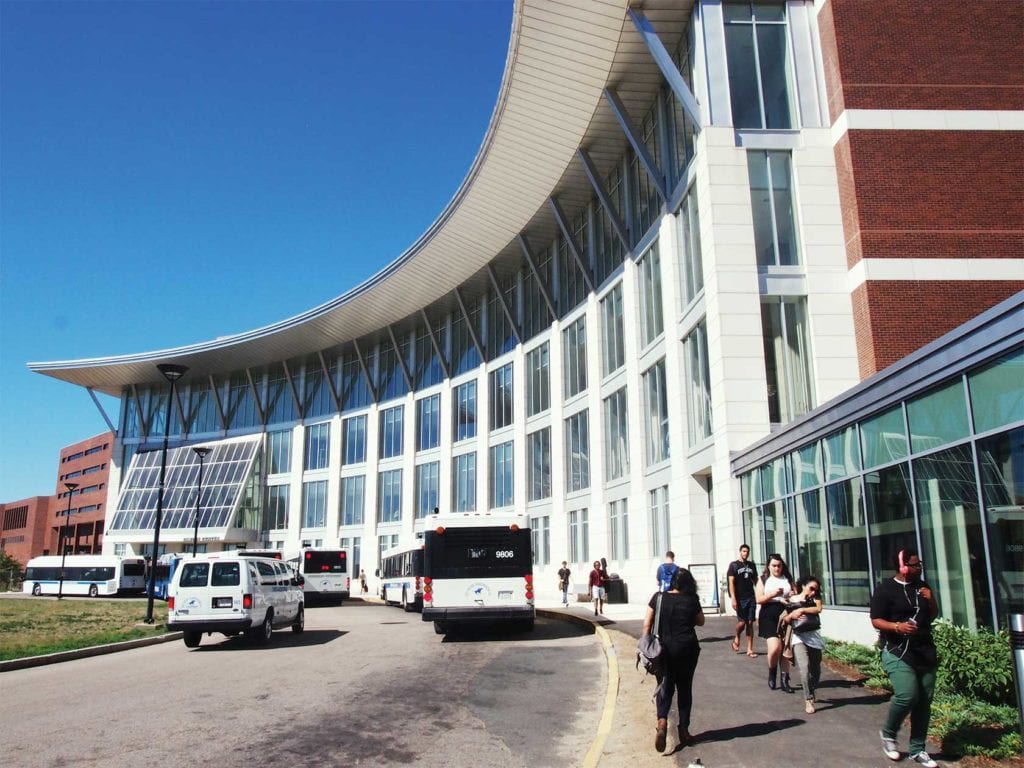Future uncertain at UMass institutes
Trotter director taking early retirement, UMass has no plan for replacement

News that longtime Trotter Institute Director Barbara Lewis was taking a voluntary retirement sparked worry last week, with the Trotter and other institutes at UMass Boston facing uncertainty around their budgets.
Asked when or whether Lewis will be replaced, a spokesman for UMass Boston said the university has not yet decided.
“Professor Lewis’ retirement was part of a recent campus-wide voluntary separation program,” the spokesman said in an email. “At this time we have not finished our evaluation of which positions will be replaced.”
Lewis’ departure comes two years after UMass Boston’s former interim chancellor Barry Mills put the William Munroe Trotter Institute, Mauricio Gastón Institute and the Institute for Asian American Studies on what university officials refer to as a five-year “glide path to self-sufficiency.” While the administration at UMass expects the institutes to raise funds to replace funding they received, UMass staff with ties to the institutes expressed doubt as to whether they would remain viable.

Institute for Asian American Studies Paul Watanabe gives a presentation at The Boston Foundation in May as Trotter Institute
researcher Rita Kiki Edozie, Institute for New England Native American Studies Director J. Cedric Woods and Gaston Institute Director Lorna Rivera look on. BANNER FILE PHOTO
State Sen. Nick Collins inserted language in the state’s fiscal year 2020 budget barring the university from reducing the institutes’ funding below the fiscal year 2018 level.
“The institutes are supporting underrepresented communities in the state,” he said. “They produce data and information that helps the state make better decisions.”
Neither Collins nor anyone else reached by the Banner has received information on the university’s planned 2020 funding for the institutes.
“I expect that they’ll be following the letter of the law,” Collins said.
At the institutes, people are equally in the dark, said Institute for Asian American Studies Director Paul Watanabe.
“The current status is just not clear,” he said. “We haven’t received any direct communication from the administration.”
The Institute for Asian American Studies, the Mauricio Gastón Institute, the William Munroe Trotter Institute and the Institute for New England Native American Studies are the only public research institutes for Asian American, Latino, African American and Native American studies in Massachusetts.
In May, the four institutes teamed up with The Boston Foundation’s Indicators Project, UMass Boston’s Donahue Institute and its McCormack Graduate School of Policy studies to release a comprehensive report detailing demographic shifts in populations of Asians, blacks, Latinos and Native Americans in Massachusetts, with detailed information on subsets of those populations including people of Haitian, Dominican, Vietnamese and Cape Verdean ancestry.
The data gleaned by the institutes detailed the nuanced changes in areas such as housing patterns, economic status and educational attainment for dozens of subsets of the Asian, black and Latino populations in the state.
“The institutes have been at the forefront of providing research, information and data that gives legislators a better roadmap for economic development, particularly in diverse communities,” said state Rep. Carlos Gonzalez, a Democrat from Springfield. “They provide a clear picture of demographic changes in Massachusetts. It’s not only for legislators. It’s information that’s useful for corporations and businesses looking to market and provide services in Massachusetts.”
Miren Uriarte, who was the founding director of the Gastón Institute, said she is particularly concerned about the fate of the Trotter Institute, given the director’s departure and the lack of communication from university officials about the fate of the institute.
“It is critical for the African American community in Boston that the Trotter Institute not close,” she said. “Given everything that’s happening in Boston now, it’s needed more than ever. Having people who are knowledgeable thinking about the challenges facing your community — that’s what the institutes are all about.”
Uriarte called the Trotter Institute’s studies of the state’s African American population “path-breaking” work.
“They were some of the first deep analyses of problems facing African Americans by African Americans,” she said. “It’s not people from outside the community discussing what’s going on inside the community. It’s academics from the community.”
In addition to the amendment barring cuts to the institutes, Collins also requested that the university direct the projected $235 million lease of its 20-acre Bayside Exposition Center toward paying down debt, rather than investing it in new construction projects.
“My public charge is to ensure that the Bayside site is used to stabilize UMass,” he said. “It’s going to be critical to driving down debt service, which is costing them more than $10 million a year.”
Collins said the reduced costs of debt service would be more than adequate to maintain funding of the institutes.
Uriarte said the local community will have to take an active role in ensuring the Trotter remains open.
“Are we as a city willing to lose the Trotter Institute?” Uriarte said. “If not, we have to speak up. If we decide we want to fight for it, we have to make sure the community picks the director. We can’t lose the Trotter.”






